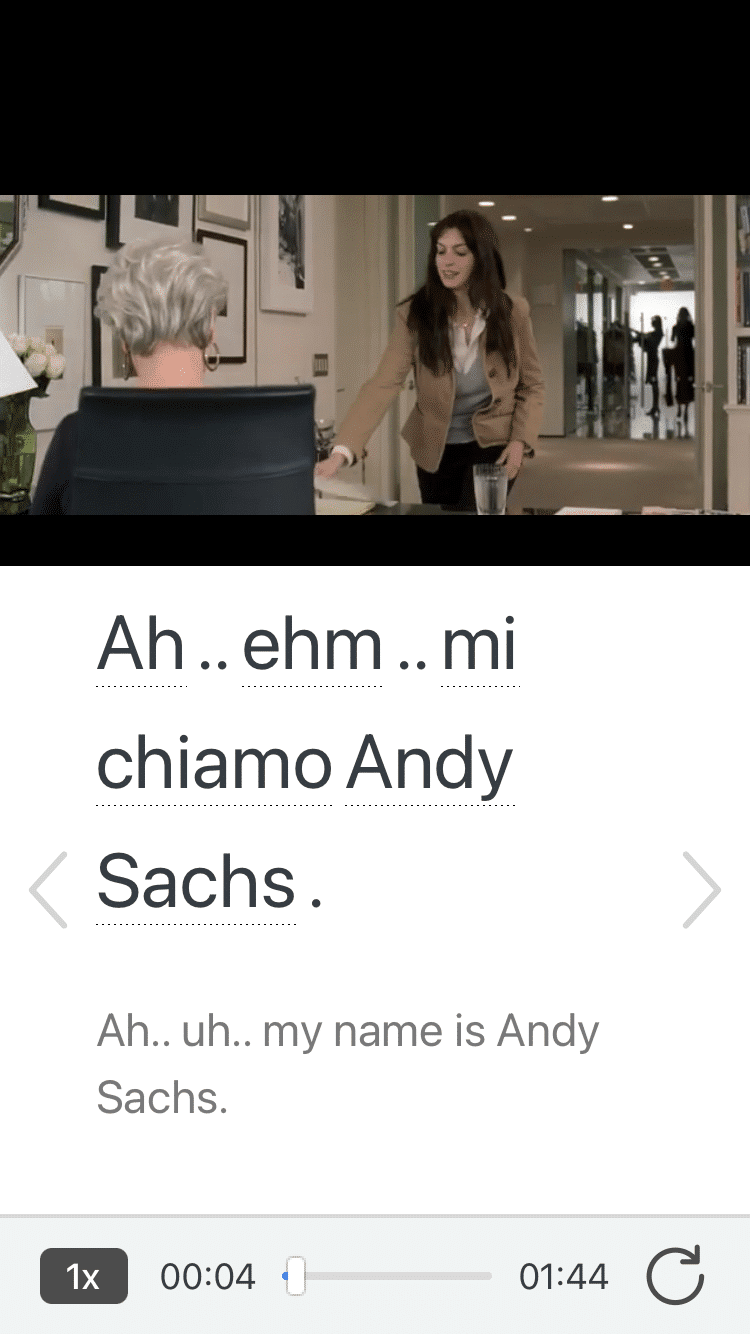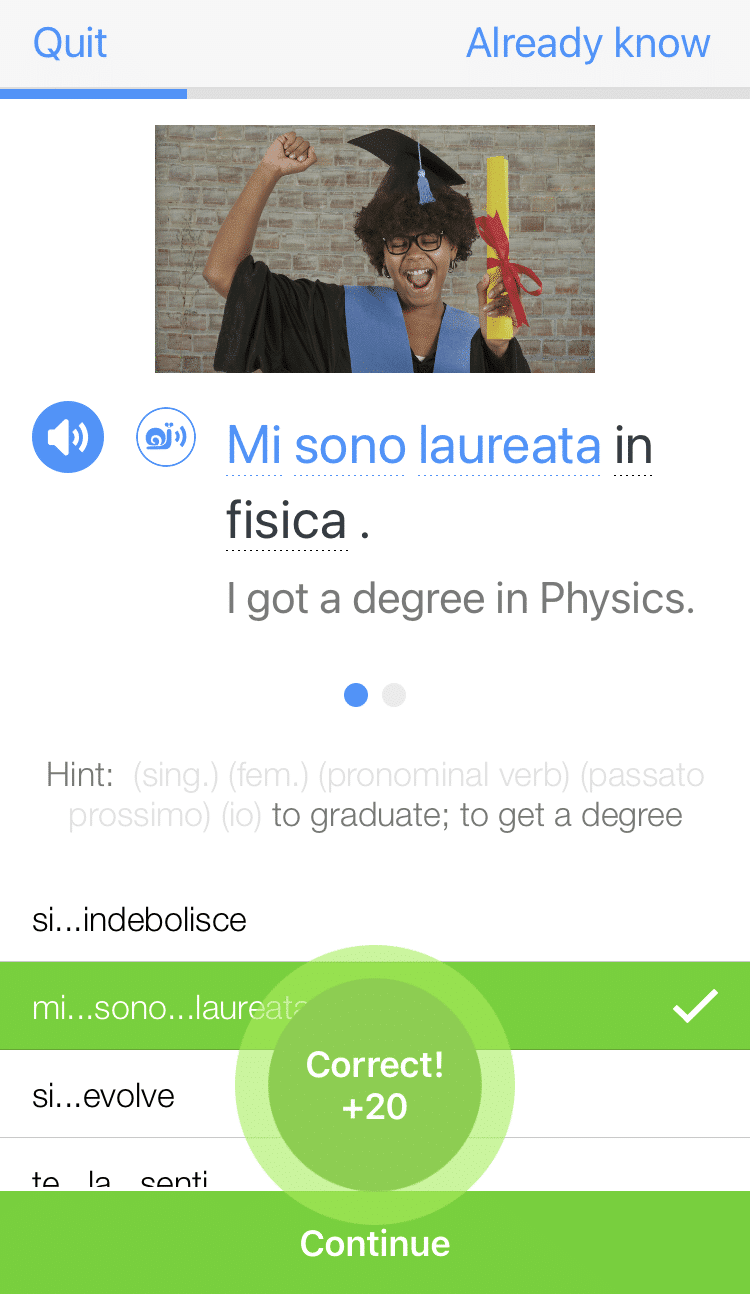
Italian Future Tenses: Conjugations, Uses and Key Rules
Italian tenses can be challenging at first.
But there’s good news, too! The Italian future tense is a lot more straightforward than other verb tenses you’ve learned before, like the present tense, present continuous and commands.
This post will focus on what the Italian future tenses are and how to use them, so you can talk about events in the future and speculate about the future correctly.
Contents
- What Are the Italian Future Tenses?
- Italian Simple Future Tense
- Italian Future Perfect Tense
- Resources to Learn More About Italian Future Tenses
- And One More Thing...
Download: This blog post is available as a convenient and portable PDF that you can take anywhere. Click here to get a copy. (Download)
What Are the Italian Future Tenses?
Italian has two future tenses:
- The simple future
- The future perfect
The simple future tense is used to talk about what will happen in the future, and is used when speculating about the future. It’s also used less frequently to make commands.
Here’s an example in which an action will be completed in the future:
Io parlerò italiano fluentemente. — I will speak Italian fluently.
Here’s an example in which the future is being speculated about:
Probabilmente pioverà domani. — It will probably rain tomorrow.
And here’s an example of the simple future tense being used as a command:
Mangerai tutto il tuo cibo! — You will eat all your food!
The Italian future perfect is used to talk about what will have happened at a point in the future. This form isn’t used very much, but it’s worth being aware of it.
Here’s an example:
Entro domani avrò finito di leggere quel libro. — By tomorrow, I will have finished reading that book.
Italian Simple Future Tense
How to Form the Italian Simple Future
–Are and –ere verbs
To form the future tense with regular –are and -ere verbs, you simply take the stem and add the following endings: -erò, -erai, erà, eremo, erete and -eranno.
Here are the simple future tense conjugations with the common verbs parlare (to speak) and credere (to believe):
| Pronoun | Future tense ending | -Are example: Parlare (to speak) | -Ere example: Credere (to believe) |
|---|---|---|---|
| lo | -erò | Parlerò | Crederò |
| Tu | -erai | Parlerai | Crederai |
| Egli/ella | -erà | Parlerà | Crederà |
| Noi | -eremo | Parleremo | Crederemo |
| Voi | -erete | Parlerete | Crederete |
| Essi/esse | -eranno | Parleranno | Crederanno |
For -are verbs, there are some spelling changes to consider. These are to ensure that the pronunciation of the last consonant stays constant:
- Verbs ending in –ciare and –giare drop the i before adding the simple future endings. This helps maintain the sounds of the ci (like the “ch” in “check”) or gi (the “j” in “judge”).
So cominciare (to begin) becomes io comincerò, tu comincerai, lui comincerà, etc. (I will begin, you will begin, he will begin, etc.)
- Verbs ending in –care and –gare must have an h added to the end of the stem before adding simple future endings. This keeps the c sounding like a “k” and the g sounding like the “g” in “guess.”
This means that legare (to tie) is conjugated io legherò, tu legherai, lui legherà, etc. (I will tie, you will tie, he will tie, etc.)
-Ire verbs
To form the future tense with regular -ir verbs, you simply take the stem and add the following endings: -irò, -riai, irà, iremo, irete and –iranno.
We will take fuggire (to escape, to run away) as our example:
| Pronoun | Future tense ending | Example: Fuggire (to escape, to run away) |
|---|---|---|
| Io | -irò | Fuggirò |
| Tu | -irai | Fuggirai |
| Egli/ella | -irà | Fuggirà |
| Noi | -iremo | Fuggiremo |
| Voi | -irete | Fuggirete |
| Essi/esse | -iranno | Fuggiranno |
Irregular Verbs in the Italian Simple Future
Hold tight for a moment, though—as usual, there are a few irregularities. But even these aren’t so bad when dealing with the future tense.
Verbs that eliminate vowel before R in ending
Certain irregular verbs eliminate the vowel before the R in the ending.
- Andare (to go): io andrò, tu andrai, lui andrà, etc.
- Avere (to have): io avrò …
- Cadere (to fall): io cadrò …
- Dare (to give): io darò …
- Dovere (to have to, must): io dovrò …
- Fare (to make, to do): io farò …
- Potere (to be able to): io potrò …
- Sapere (to know): io saprò …
- Stare (to be): io starò …
- Vedere (to see): io vedrò …
- Vivere (to live): io vivrò …
Verbs that add a double R
Certain irregular verbs must add a double R to maintain correct pronunciation.
- Bere (to drink): io berrò, tu berrai, lui berrà, etc.
- Condurre (to drive): io condurrò …
- Tenere (to hold, to keep): io terrò …
- Venire (to come): io verrò …
- Volere (to want): io vorrò …
Essere (to be)
Finally, let’s look at the cranky oddball that is essere (to be), and its conjugations:
io sarò — I will be
tu sarai — you [singular, informal] will be
lui / lei / Lei sarà — he / she / you [singular, formal] will be
noi saremo — we will be
voi sarete — you [plural] will be
loro saranno — they will be
These are the main irregular verbs that most learners will need to worry about. And for particularities of irregular Italian verb conjugations, WordReference has an excellent conjugating tool.
Uses of the Italian Simple Future Tense
1. Talking about future actions
Farà freddo. Indosseremo delle felpe. — It is going to be cold. We are going to wear sweatshirts.
Loro dormiranno tutto il pomeriggio. — They are going to sleep all afternoon.
Sono sicurissimo che sarà un viaggio divertente. — I am extremely sure that it will be a fun trip.
Raffaella sarà la punta di diamante della scuola di ballo. — Raffaella is going to be the star dancer of the dance school.
Fingerò di essere irraggiungibile. — I will pretend to be unreachable.
Le nuove elezioni cambieranno il paese. — The new election will change the country.
Io terrò un comportamento impeccabile. — I will behave impeccably.
Domani vedrai quanto sono goffo a ballare. — Tomorrow you will see how clumsy I am when I dance.
Sarà il suo compleanno. — It will be her birthday.
Note that unlike the following example in English, both parts of a good Italian future sentence can be in the future tense:
Non rifiuterò la mozzarella quando sarò a Napoli. — I will not turn down mozzarella when I am in Naples.
Fino a venerdì mattina non sapremo con certezza se potremo volare. — Until Friday morning, we won’t know for sure if we can fly.
2. Speculating about the future
The future tense is also often used to talk about speculation. For example, I’ve got a future trip to Naples on my mind to visit my darling wayward Raffaella. And if I actually get there, and she is nowhere to be found, I can still keep using the future tense but now with a speculative meaning:
Dove sarà? — Where could she be?
I’m wondering in this case where the heck she is right now, not asking where she will be at some point in the future.
If I’m unrealistic, I can ask myself if she has been unjustly detained:
Forse sarà alla stazione di polizia. — Perhaps she is at the police station.
And if I’m smarter, I can speculate:
Sarà che Raffaella non mi ama? — Perhaps it’s just that Raffaella doesn’t love me?
3. To make commands
You can also form imperatives with this tense, but you may end up sounding like a maffioso (a person affiliated with the mafia).
Farai tutto quello che ti dico, va bene? — You’ll do what I say, alright?
Italian Future Perfect Tense
How to Form the Italian Future Perfect
The other future tense to worry about in Italian is the future perfect. It’s not difficult to form if you have studied the past tense.
Here’s how to form the Italian future perfect tense:
Future tense form of auxiliary verb avere or essere + the past participle of the main verb
Here is an example with avere (to have) as an auxiliary (or helping) verb:
- io avrò parlato — I will have spoken
- tu avrai parlato — you [singular, informal] will have spoken
- lui / lei / Lei avrà parlato — he / she / you [singular, formal] will have spoken
- noi avremo parlato — we will have spoken
- voi avrete parlato — you [plural] will have spoken
- loro avranno parlato — they will have spoken
And here is an example with essere (to be):
- io sarò andato / andata — I will have gone
- tu sarai andato / andata — you [singular, informal] will have gone
- lui / lei / Lei sarà andato / andata — he / she / you [singular, formal] will have gone
- noi saremo andati / andate — we will have gone
- voi sarete andati / andate — you [plural] will have gone
- loro saranno andati / andate — they will have gone
You will notice that the past participle (e.g., andato/a/i/e) is modified just as it would be in the passato prossimo.
Uses of the Italian Future Perfect
The Italian future perfect tense is used to talk about what may come to pass in the future.
I’m stuck in dreary Germany this week, but have a Friday overnight train ticket for Naples, I can wax dreamily about my weekend:
Il sabato mattina sarò già arrivato a Napoli. — On Saturday morning I will have already arrived in Naples.
This is pretty straightforward, but the tense is also used in ways that might seem a bit stranger to English speakers. It can be used, for example, to speculate about past things:
Avrà cambiato idea. — Perhaps he changed his mind.
Note that there is no intent to talk about the future in that case. The way to say this in Italian without the future perfect is:
Forse ha cambiato idea. — Perhaps he changed his mind.
Similarly I could use it to speculate about my deluded or dense Neapolitan darling who somehow manages to misunderstand my perfect Italian WhatsApp missives about where and when to meet:
Scrivo tanto bene in italiano, ma Raffaella non avrà imparato a leggere? — I write in perfect Italian, but Raffaella perhaps hasn’t learned to read?
While the future perfect tense is part of standard Italian, most Italians tend to use other workarounds to avoid using it, especially in conversation. One such common alternative is: dopo + past infinitive, like in this example:
Ti chiamerò dopo aver verificato che ci sono posti. — I will call you once I have verified that there are two seats available.
Resources to Learn More About Italian Future Tenses
Looking to read more about, and get some practice with, the future tenses?
- “Soluzioni” by Denise de Rome has a great chapter on the future tense.
- FluentU. You can try using this immersive language learning program to hear native speakers use the Italian future tenses in context.
FluentU takes authentic videos—like music videos, movie trailers, news and inspiring talks—and turns them into personalized language learning lessons.
You can try FluentU for free for 2 weeks. Check out the website or download the iOS app or Android app.
P.S. Click here to take advantage of our current sale! (Expires at the end of this month.)
- This test of the future simple tense and this of the future perfect test your future tenses knowledge.
So there you have it: the Italian future tense really isn’t all that complicated.
Now you can talk about hopes and dreams, and even speculations and predictions for the future. And hopefully those dreams include Italy, or at least speaking Italian.
Download: This blog post is available as a convenient and portable PDF that you can take anywhere. Click here to get a copy. (Download)
And One More Thing...
If you're as busy as most of us, you don't always have time for lengthy language lessons. The solution? FluentU!
Learn Italian with funny commericals, documentary excerpts and web series, as you can see here:

FluentU helps you get comfortable with everyday Italian by combining all the benefits of complete immersion and native-level conversations with interactive subtitles. Tap on any word to instantly see an image, in-context definition, example sentences and other videos in which the word is used.

Access a complete interactive transcript of every video under the Dialogue tab, and review words and phrases with convenient audio clips under Vocab.

Once you've watched a video, you can use FluentU's quizzes to actively practice all the vocabulary in that video. Swipe left or right to see more examples of the word you’re on.

FluentU will even keep track of all the Italian words you’re learning, and give you extra practice with difficult words. Plus, it'll tell you exactly when it's time for review. Now that's a 100% personalized experience!
The best part? You can try FluentU for free with a trial.
Start using the FluentU website on your computer or tablet or, better yet, download the FluentU app from the iTunes or Google Play store. Click here to take advantage of our current sale! (Expires at the end of this month.)



